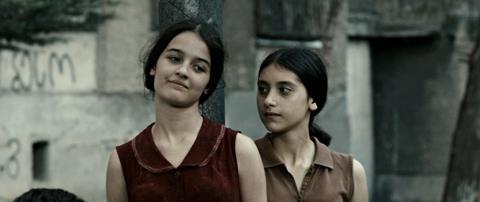Dirs: Nana Ekvtimishvili, Simon Gross. Germany-Georgia-France. 2013. 102mins

It’s about the most dependable genre in art cinema: the autobiographical coming-of-age story with a vividly evoked cultural or political background. But Georgian film In Bloom (Grzeli Nateli Dgeebi) has enough going for it to stand alone within the tradition as a hugely distinctive and individual piece. A very personal essay by writer-director Nana Ekvtimishvili - co-directing with German collaborator Simon Gross (Fata Morgana) - In Bloom is a deeply satisfying exercise with a strong female angle that stands every chance of breaking out from the festival circuit into modest art-house exposure.
The film is terrifically cast, its two young leads having an intense but easy on-screen manner.
The setting, based on Ekvtimishvili’s reminiscences, is Georgian capital Tblisi in 1992, soon after the break-up of the USSR and at a time when Georgia was entering into conflict with the disputed territory of Abkharia. The heroines are two schoolmates in their early teens. Eka (Babluani), from whose point of view the story is largely told, lives with her mother in a book-filled apartment from which her father is absent - it’s only later explained why - though Eka jealously guards a box of his possessions for his return.
Meanwhile Natia (Bokeria) lives in a chaotic atmosphere of discord among her working-class family, with a wayward kid brother and fearsome granny to contend with. The class beauty, Natia has two admirers. The one she favours is the romantic, handsome Lado (Zakareishvili), who gives her a gun to protect herself with while he’s away in Moscow. But then there’s the local tough Kote (Gogaladze), who isn’t going to tolerate rivals without a fight.
For much of the time, In Bloom is a leisurely, episodic drama, sketching out its heroines’ lives in vignettes - scenes of classroom disruption, skirmishes with the diminutive school bully, explosions of discord in the bustling bread queues. There are also evocations of life in the run-down but still beautiful city - teenage girls getting together to smoke and sing in net-curtained flats - that have a timeless quality, with some moments might have easily fitted into, say, the lyrical early Georgian-set films of Otar Iosseliani. So the occasional burst of Phil Collins comes as a bit of shock - but that’s just part of the very specific historical background that makes itself felt in news broadcasts, references to the war and the occasional dramatic appearance of militia.
In fact, male violence - on both national and local levels - is the underlying theme. The current of male rivalry in the school and on the streets comes startlingly to a head when Lado returns to town, and there’s clever use of the leitmotif of the gun, which the girls repeatedly swap between them - although it’s Eka who finally ensures that the gun doesn’t lead the narrative towards the ending we might expect.
The film is terrifically cast, its two young leads having an intense but easy on-screen manner; Babluani exudes intelligent defiance, and has a show-stopping moment performing a local dance with style, sang froid - and in a single extended shot. The bleached-out photography by Oleg Mutu (known for his work with Romanian directors Cristi Puiu and Cristian Mungiu) makes this a visibly potent package too - a bloom definitely to be cherished.
Production companies: Indiz Film, Polare Film, Arizona Films, ZDF – Das kleine Fernsehspiel
International sales: Memento Films International, www.memento-films.com
Producers: Simon Gross, Mark Waachter
Co-producers: Guillaume de Seille, Nana Ekvtimishvili
Screenplay: Nana Ekvtimishvili
Cinematography: Oleg Mutu
Editor: Stefan Stabenow
Production designer: Konstantine Japharidze
Main cast: Lika Babluani, Mariam Bokeria, Zurab Gogaladze, Data Zakareishvili




















